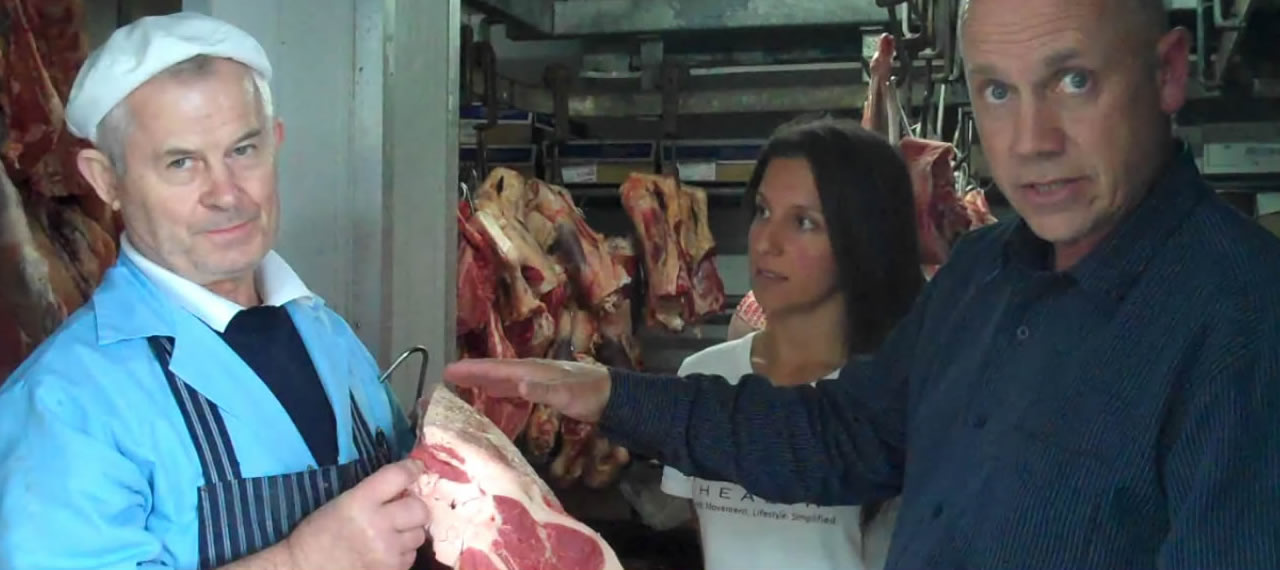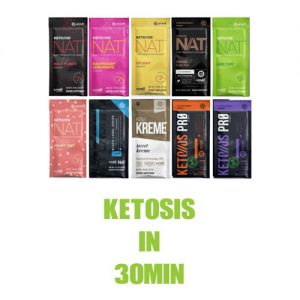Note: This is a loose transcription of the video, ‘Meat Part 4 – What Makes Meat Lean and Tender?’
Bex: Andrew, I’ve learned a lot about meat from you, in my time shopping here. The one thing, that you have talked about is how aging makes the meat very tender, especially grass fed meat; which tends to be tough.
Andrew: Yes it can be a little tougher…
Bex: Tell me more about the aging process. Is it long or short? Do all butchers do that?
What makes meat lean and tender?
Now, the aging process can go on for months and months, if you got the correct microbial environment. We haven’t invested in the thousands and thousands of dollars you would need for special cool rooms to age your meat for three months. That’s NOT what we do here. We are aging our meat specifically to try and tenderise it a little bit, so grass-fed meat which is inherently tougher than grain-fed can be as soft and tender as the grain-fed equivalent, if you buy it from here.
Bex: That would explain a lot about why grass-fed meat would be better than grain-fed meat for people who are concerned about their health and weight loss and fat consumption, because, what you’re saying is that the grass-fed meat is tougher because it has less fat?
Andrew: It’s only slightly tougher. Because it has less fat in it. It’s less marbling, which is that grainy texture running through the meat of the steak, which chefs in restaurants prize.
But the health benefits of grass-fed meat is well-documented, well, well-documented. Search the internet. You’ll immediately see there are many benefits of grass-fed over grain-fed. The benefits to your heart, your brain, some of the essential acids that your body needs to operate healthily…much,much higher levels in grass-fed meat. So, why would you want to eat grain-fed meat? Why?
Bex: Exactly!
Andrew: Why bother, when it’s (grass-fed) healthier to eat. Grass-fed, it is a misconception that it’s more expensive. I mean if you go the cheapest butcher in town, we (Brookvale Meats) will be a tiny bit more expensive. But we’re talking about pennies, cents. We’re not talking about large differences in prices, only very little fractions. Yeah, the animals have done lots of wandering around the paddock, and had a full life. If that’s not worth paying an extra 3 or 4 percent for, then I don’t know what is.
Bex: I couldn’t have said it better.
Andrew (in reference to their cuts in a fridge): Okay, here at Brookvale Meats, we buy in whole carcasses direct from farms and then we bring them in and we break them down. Boris here has worked with us for nearly 40 years so he knows a few things about breaking down animal carcasses. Now, one of Boris’ jobs is to break down the whole body into what are called the ‘primals’ and the primals are different, aren’t they Boris? So what do you have there?
Borris: Sirloin Steaks.
Andrew: Sirloin Steaks, also know as a New York cut. Porterhouse?
Borris: Same thing. It’s all the same.
Andrew: So the T-bone, on one end has the Porterhouse going through it and sometimes the T-bone has the eye fillet on the other end. In here (pointing to the fridge), the carcasses are de-boned, the primals are hung up to age for about a week to 10 days trying to tenderise them. That’s how it’s done!
Bex: Just to conclude, is there anything else that you would recommend that consumers ask a butcher, when they’re looking for a butcher with good quality meat.
Andrew: I think it’s not a question of asking the butcher necessarily, it’s just a question of getting to know your butcher. Whether it’s Brookvale Meats or any other reputable butchers, there are plenty of decent butchers on the Northern Beaches (and the world!). It’s a question of getting to know your butchers, so that you can find out: where it’s coming from, what it’s been eating, what are you putting on the table, recommendations, what’s good this week? My daughter can’t eat fats, so what cuts are better? My son is allergic is to nitrates, have you got any ham or bacon that hasn’t got nitrates? It is just the question of getting to know your butcher, to allow your butcher to do what he wants to do, just help you buy what you need.
Bex: Fantastic.
Andrew: Just develop a relationship with your butcher, wherever it is.
Bex: Fantastic.
Bex: Well, thank you so much for taking the time today to explain that to us…
Andrew: Thank you so much for giving the opportunity to.
Bex: …so that we can make better choices about food.
Other videos in this series:
Meat Part 1 – You CAN Afford Grass Fed Meat!
Meat Part 2 – Do You Know Where Your Meat Comes From?
Meat Part 3 – What is Free Range, Grass Fed, Organic Meat?
Meat Part 4 – What Makes Meat Lean and Tender? – September 2013








